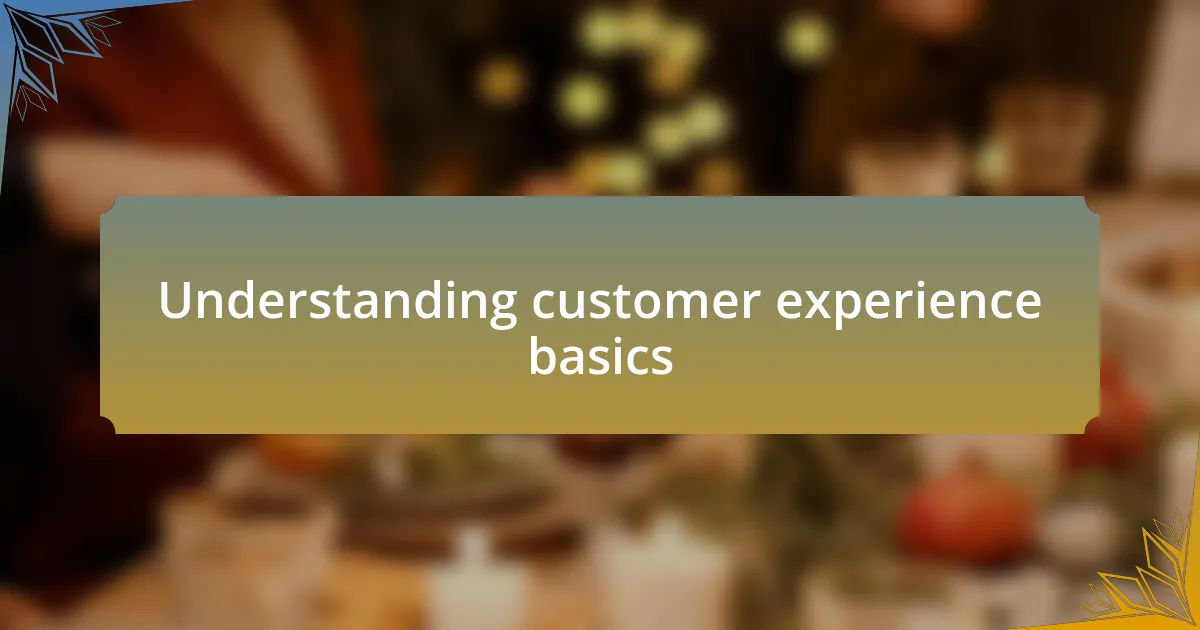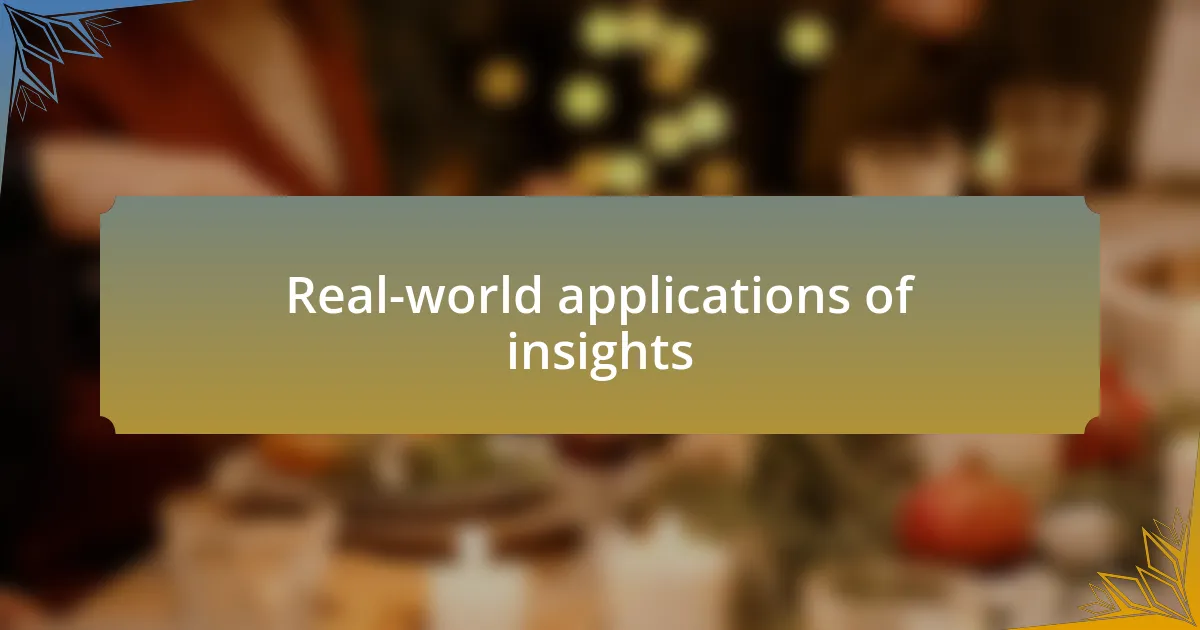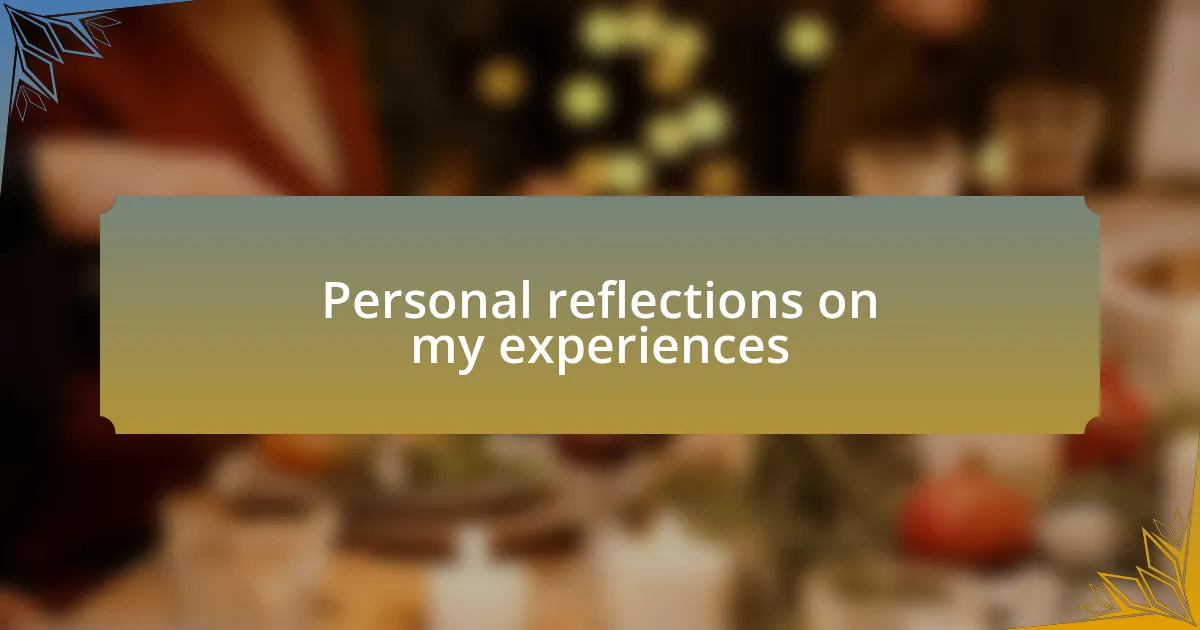Key takeaways:
- Customer experience (CX) is about creating meaningful interactions through empathy and personal connections.
- Personalization and recognition of customer preferences enhance satisfaction and loyalty, as shown in case studies from hotels and restaurants.
- Timely feedback mechanisms, such as immediate surveys, empower customers and facilitate real-time improvements in service.
- Utilizing data analytics for predictive insights allows businesses to tailor experiences and meet customer needs proactively.

Understanding customer experience basics
Understanding customer experience (CX) basics is like peeling back the layers of an onion; each layer reveals insights about what truly matters to customers. From my experience, it’s crucial to recognize that CX isn’t just about satisfaction—it’s about creating a meaningful interaction. Have you ever felt entirely at ease in a store, not just because of the products but because of the personable staff? That’s the kind of connection that transforms a simple transaction into a memorable experience.
When I first began exploring CX, I realized that it’s fundamentally about empathy. Think about a time when you received excellent service; perhaps the staff anticipated your needs before you even voiced them. In those moments, it’s as if the company understands you on a personal level, creating a bond that keeps you coming back. Engaging with customers on this emotional level is not just smart; it’s essential.
I often find myself reflecting on how small details can lead to significant outcomes. For instance, a handwritten note thanking a customer for their business can greatly enhance their perception of your brand. It makes customers feel valued and recognized, fostering loyalty in a way that a generic email simply cannot. Isn’t it fascinating how little gestures can leave lasting impressions and contribute to a richer customer experience?

Key takeaways from case studies
When delving into case studies, one key takeaway is the power of personalization. I vividly recall a case where a hotel chain implemented a guest recognition program. They tracked preferences, remembering special requests like extra pillows or favorite snacks. This not only enhanced guest satisfaction but also built a loyalty that kept travelers returning. Can you imagine walking into a familiar place and feeling instantly welcomed? That’s the magic of knowing your customers personally.
Another significant insight I’ve gained from analyzing CX case studies is the importance of timely feedback. In one instance, a restaurant introduced a rapid survey system to gauge customer satisfaction right after dining. The immediate responses allowed managers to address any issues while they were fresh in the customer’s mind. It often struck me how willing people are to provide input when they know their opinions matter. Have you ever filled out a survey right after a meal? It feels rewarding to have a voice and see that a business is actively listening.
Lastly, I often reflect on how case studies highlight the necessity of a cohesive omnichannel approach. For example, a leading retail brand seamlessly integrated online and in-store experiences, allowing customers to return items purchased online in-store. This not only streamlined the process but also made shopping less stressful for customers. Isn’t it incredible how a simple change can create a more fluid experience? These case studies reinforce the idea that every touchpoint can shape customer perceptions and, ultimately, their loyalty.

Real-world applications of insights
Real-world applications of insights often reveal the nuances that can elevate customer experience dramatically. For instance, I witnessed a software company that integrated user feedback directly into their product development cycle. By involving customers as beta testers, they not only honed their product features but also cultivated a sense of community. Wouldn’t it be amazing to feel like your input is genuinely shaping the tools you use daily?
Another example that stands out to me is a telecommunications provider that personalized their support interactions. They utilized CRM tools to log customer history and preferences, leading to agents being able to resolve issues faster while building rapport. It’s fascinating how a simple acknowledgment of a past conversation can make a customer feel valued and understood. Have you ever experienced that warm feeling when a representative remembers your name or specific concerns?
Furthermore, I’ve seen organizations use data analytics to predict customer needs even before they arise. A retail giant, for instance, employed predictive modeling to analyze purchasing patterns, allowing them to suggest products proactively. When I first came across this strategy, it struck me as almost intuitive—like having a personal shopper who understands your preferences better than you do. Isn’t it intriguing how harnessing data can create such tailored experiences?

Personal reflections on my experiences
Reflecting on my journey through various customer experience case studies, I find that a single interaction can dramatically shift my perspective. I once participated in a focus group for a new restaurant, and it struck me how eager the staff was to adjust their menu based on our feedback. The sincerity in their approach made me feel more than just a customer; I was part of the dining experience itself. Have you ever had a moment where your opinion seemed to truly matter?
Another experience that resonates deeply with me involved a hotel chain that truly embraced personalization. On a visit, I received a welcome note mentioning my dietary preferences from previous stays. This small but thoughtful touch made my stay memorable, and it got me thinking about how impactful it is when brands take the time to acknowledge who we are as individuals. Isn’t it amazing how such a simple detail can create lasting loyalty?
I also remember an encounter with a tech support team that turned a frustrating situation into a positive one. After reporting an issue, I was called back not just with a solution but with an offer for a follow-up to ensure everything was running smoothly. That proactive outreach left me feeling genuinely cared for rather than just another ticket in their support system. Have you had a similar experience where a company’s follow-through transformed your perception?